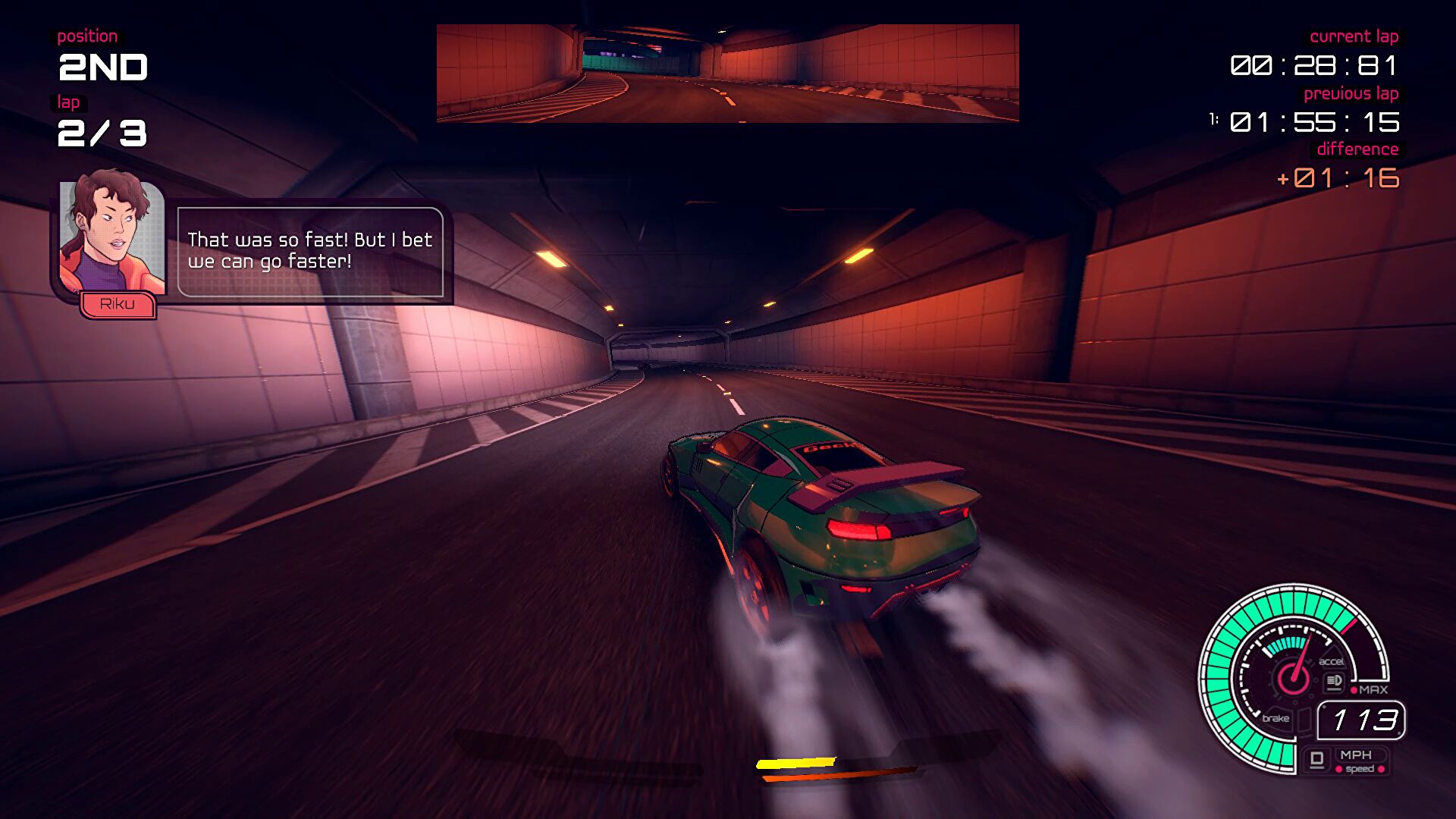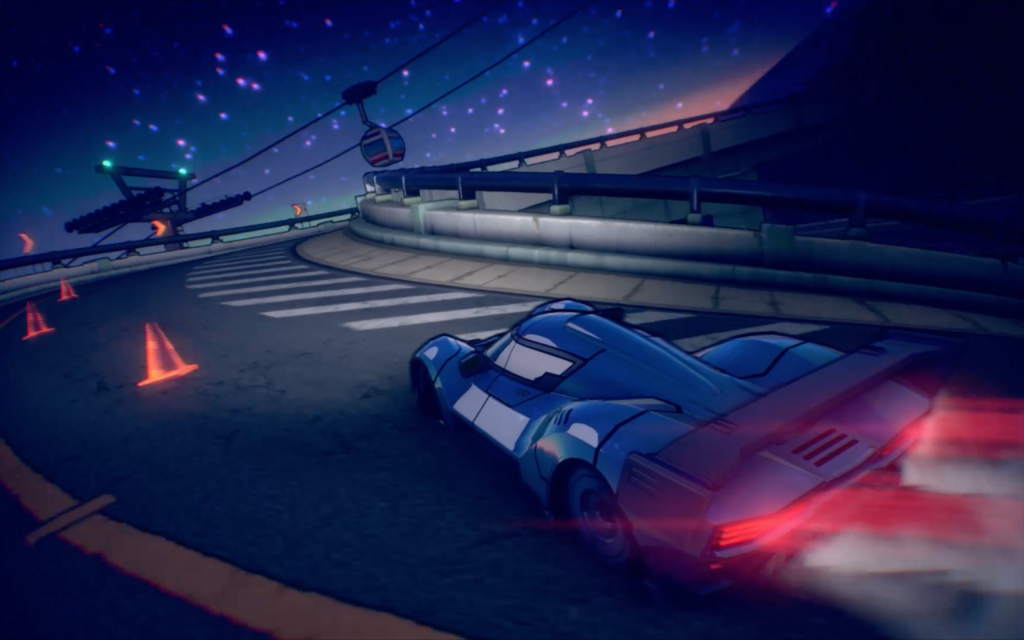Inertial Drift’s an arcade racer that’s both familiar and refreshingly different; styled after the eternally slick Ridge Racer Type 4, developer Level 91’s debut distinguishes itself with a novel handling model built around a twin-stick system. It’s innovative and kind of ingenious, putting a welcome emphasis on the art of wrestling with a car that wants to live life sideways. “I’d started working on this prototype based on Ridge Racer,” Michael O’Kane, director and programmer of Inertial Drift, tells me. “I loved Ridge Racer, and I felt like there was a style of drifting arcade game that had disappeared.” Inertial Drift was O’Kane’s attempt to get back to a style of racer that had been lost to time - one where the focus was on the drifting itself. “Whenever you start making a game, you start thinking about genre distinctions,” he says. “I feel like there’s a big distinction between old-style, pure drifting games and the switch to boosts becoming an incentive to drift - it completely changed everything, and so the tracks got wider and wider to make that possible and it became less about being precise.” In O’Kane’s ideal arcade racing game, the drifting is the reward - which is why it’s vital that it have depth and nuance, something which Inertial Drift’s delivers on generously. Its unique twin-stick control method is behind much of that; here, the left stick steers while the right controls drift angle, with success being about finding a balance between those inputs and the throttle and brake. The result is an elastic dance I’ve never really tired of despite returning to Inertial Drift again and again, and what distinguishes it from its peers. It’s the willingness to build upon classics such as Ridge Racer rather than merely imitate them that makes Inertial Drift special, and it helps that it builds upon them in such a fascinating way. “Ridge Racer was basically on rails,” says O’Kane. “The only real interaction you’re having is how early you start drifting. I was looking at it from the perspective of what if you took some of the base goals of what they were trying to achieve - which was making you able to do a cool thing really easily - but with the advantage of having twin sticks and a lot more time to spend on physics processing work. What’s the next evolution of that? “The idea behind it initially was just lowering that accessibility barrier but without taking away control from you - games normally get between you and the controls and do things for you, I don’t do any of that for you, I just make it really easy to control exactly what the car is doing. “I’ve always thought Skate was an incredible jump to take from Tony Hawk - they sat down and were like what if we just forget about how skating games are supposed to work? They did all the twin stick stuff there, and I’ve always thought that was pretty incredible. And so I had a similar approach - if you forget how a car actually works altogether, and instead you’re like, what’s the most interesting way to control the car with a controller where you have two sticks?” The ultimate proof of the success of Inertial Drift’s control scheme is that in all the time since O’Kane conceived it in 2013 he’s still to tire of it. “It blows my mind that I can go and play that first track and get distracted by just doing laps. And I’ve been doing laps of that track every week for the last eight years. There’s still something there, and it’s kind of meditative.” It makes sense that there’d be an appetite for O’Kane to deliver more Inertial Drift, which came last week in the form of the Twilight Rivals edition - a DLC pack that coincides with the racer making its way to PS5, and that introduces new tracks, new rivals and new cars that push the twin-stick handling model in new and interesting directions. “I’m pushing a little bit harder into some of the grip cars in terms of handling because I didn’t get to do as much with that previously,” says O’Kane. “And then you know, I’m also testing out some things like, for example, runoff. It was something that we added relatively late in development and so I didn’t really get to it. There’s a bunch of fun stuff to do there, like running on dirt to make your car slide. I got a little bit of an opportunity on one of the new tracks to test some of that stuff - and maybe I’ll go into even more depth in the future.” It sounds like an Inertial Drift follow-up is already rattling around O’Kane’s head, and perhaps this time there might be a bit more resource to throw behind it - the original was effectively a two-person joint, with O’Kane taking on the bulk of the work while bringing in friends and family to help bring it home (his sister even provided character art for the game). “I’ve got more ideas,” he says. “And that’s the thing we’ll probably start looking at when we’re done here. I think the handling worked out pretty well on Inertial Drift and I probably wouldn’t mess around with it too much - but there’s a lot more stuff you could do with the meta structure of events and things like that, where I think we can get a lot more value out of them. But yeah, can we do something else? That’d be an opportunity to go and refine some of the things like where maybe it fell short in some places, for me.” I love the idea of a bigger, bolder Inertial Drift successor in the future, just as much as I love the idea of O’Kane being unleashed on some of the genre’s greatest properties. Of all the arcade racers in recent years only one’s been worthy of the true greats - so I wonder what O’Kane would do if he got his hands on the seemingly dormant Ridge Racer franchise? “I have thought a lot about it!” he admits. “I know exactly what I would do if they actually gave me the licence, because it’s something I think about at night. That’d be a pretty interesting thing to do - and I’d just hopefully not piss everyone off.”

